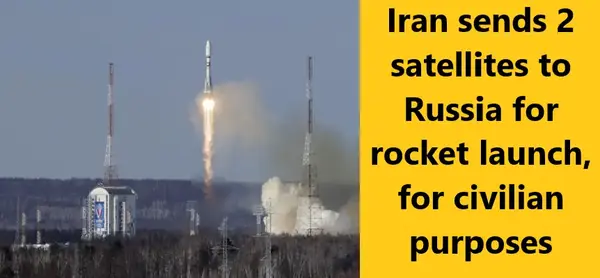Iran sends 2 satellites to Russia for launch, says they’re for civilian purposes.
Iran Strengthens Space Cooperation with Russia by Launching Two Locally Made Satellites
Dubai, UAE – October 12, 2024 – Iran has made a significant move in its growing space program, sending two locally developed satellites, Kowsar and Hodhod, to Russia to be launched into orbit by a Russian space vehicle.
Read More: Pakistan MM-1 Communication Satellite to Launch on Thursday
The Tasnim news agency reported this as the latest chapter in the space cooperation between the two US-sanctioned nations, raising geopolitical concerns, particularly from the United States and its allies.
Iran’s Private Space Sector Achievements: Iran sends 2 satellites to Russia for launch
- Kowsar Satellite: A high-resolution imaging satellite, Kowsar, is designed for use in various sectors, including agriculture, environmental monitoring, natural resource management, and disaster response. The satellite’s advanced imaging capabilities make it a vital tool for both civil and defense applications.
- Hodhod Satellite: A small communications satellite, Hodhod, aims to provide satellite-based communications in remote areas that lack access to traditional terrestrial networks. It represents a significant development in Iran’s satellite communication infrastructure.
These satellites mark a pivotal step for Iran’s private space sector, showcasing the country’s ability to independently develop sophisticated space technologies despite international sanctions.
Concerns over Russia-Iran Space Cooperation
This isn’t the first time Russia has assisted Iran in its space endeavors. Earlier in February 2024 and in 2022, Russia launched Iranian satellites, sparking concerns from US officials.
Western authorities fear that these satellites may not only support Russia’s military operations in Ukraine but also enhance Iran’s ability to monitor potential military targets in Israel and the broader Middle East.
Read More: Pakistan to Launch Satellites in a few Years
These collaborations continue despite growing warnings from the United States, citing potential threats posed by Iran’s increasing space and missile capabilities.
Iran’s Satellite Launches Amid Global Tensions: Iran sends 2 satellites to Russia for launch
In addition to its space collaboration with Russia, Iran has been actively pursuing its own satellite launch initiatives.
In September 2024, Iran conducted its second satellite launch of the year, using a rocket developed by the Islamic Revolutionary Guard Corps (IRGC).
This launch follows accusations from the US and European countries, which claim that Iran has supplied ballistic missiles to Russia for use in the Ukraine conflict—a charge Iran strongly denies.
- January 2024: Iran simultaneously launched three satellites into orbit, marking a significant achievement in the country’s space program.
- Western Concerns: Western nations, including the United States, have consistently warned Iran against satellite launches, asserting that the technology used in these launches can easily be adapted for ballistic missiles, potentially capable of delivering nuclear warheads.
The Role of Russia in Iran’s Nuclear and Military Advancements
Russia’s growing partnership with Iran extends beyond space exploration. Moscow has been accused of aiding Tehran in developing its missile and nuclear programs, which has raised alarms in Western capitals.
- Military Assistance: Tehran is reported to be supplying Russia with weapons for its war efforts in Ukraine. At the same time, concerns about escalating tensions between Israel and Iran continue to grow. Russia’s involvement in Iran’s nuclear program is being closely monitored by US and UK intelligence agencies, which are concerned about its implications for regional security.
- UN Security Council Violations: The US has pointed out that Iran’s satellite launches defy a United Nations Security Council resolution, calling on Tehran to refrain from activities involving ballistic missiles capable of delivering nuclear warheads. Iran, however, maintains that its space activities are solely for peaceful purposes, related to civil and defense uses, and has rejected accusations of pursuing nuclear weapons.
Iran’s Advancing Nuclear Capabilities
While Iran denies seeking nuclear weapons, its nuclear program has progressed significantly since the collapse of its nuclear agreement with world powers. The International Atomic Energy Agency (IAEA) has repeatedly warned that Iran now possesses enough enriched uranium for the development of multiple nuclear weapons, should it choose to produce them.
Conclusion: Iran sends 2 satellites to Russia for launch
The latest developments in Iran’s space program, particularly its collaboration with Russia, continue to raise concerns in the international community. The launch of Kowsar and Hodhod satellites demonstrates Iran’s growing technological capabilities, but it also deepens worries about the dual-use nature of the technology involved, especially given the context of Tehran’s nuclear ambitions and missile advancements.
The evolving partnership between Russia and Iran, especially in space and defense sectors, will remain under close scrutiny as tensions in the Middle East and global geopolitics continue to unfold.
Satellites could be for agriculture, environmental monitoring, disaster management and communications, but US has warned in past they could be used to identify targets in Israel: Iran sends 2 satellites to Russia for launch
Note: The information above might not be accepted 100%. Please verify from your own sources. We will not be responsible for any kind of loss due to our content.
For more news, please visit Munafa Marketing.




